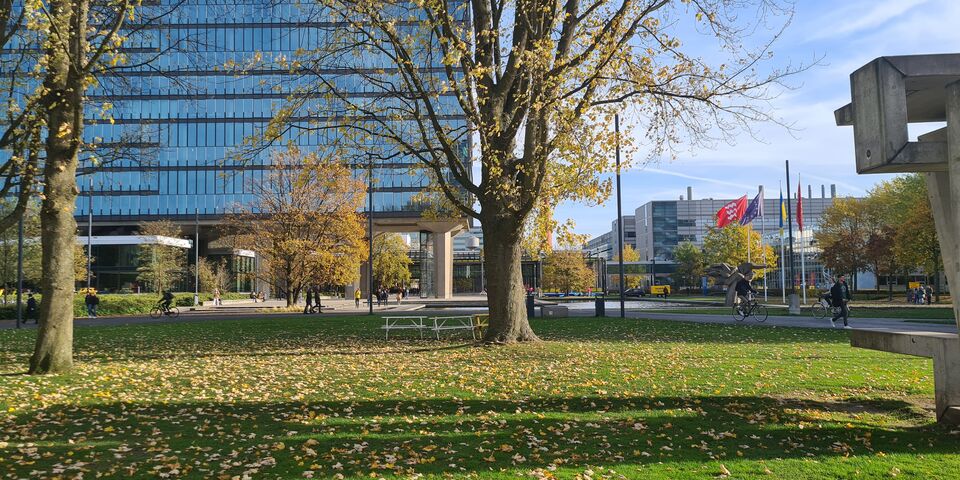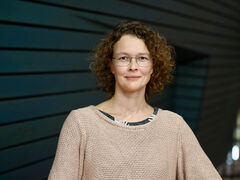The Green Young Academy (GRYA) is dedicated to accelerating the transition toward CO₂-neutral knowledge institutions in the Netherlands, with the goal of ensuring a climate-resilient future. To this end, it created the manifesto Sustainable Thinking, Sustainable Action. Parties who sign the manifesto, commit themselves to actions outlined in the document, such as embedding sustainability in education, promoting socially relevant research, and achieving climate-neutral operations.
TU/e is one of the early signatories, alongside the universities of Utrecht, Twente and Wageningen. Lenneke Kuijer, sustainability researcher at Industrial design and the only TU/e member of GRYA, explains why that matters.
To lead
“As an early signatory, you show that you want to take the lead and encourage others to join in,” she says. Tu/e has already made a name for itself with sustainable initiatives. “Throughout the process, I’ve seen that TU/e is doing well when it comes to sustainability. In 2021, Sustainability Ambassador Anna Wieczorek was appointed, which ensures continuity. One year later, a team was established to develop sustainability policy on behalf of TU/e (now called the Sustainability Office, ed.). And since 2015, there has already been a GO Green Office. At other universities, this kind of structure is still in its early stages.”
Kuijer also experiences sustainability from up close in research She is a board member of EIRES, the Eindhoven Institute for Renewable Energy Systems, which is now celebrating its fifth anniversary. Kuijer did not contribute to the manifesto itself, but did co-author GRYA’s report Thirteen Shades of Green. The report is published today and lists sustainable initiatives at thirteen Dutch universities.
Different areas of focus
“It’s great to see that each of the thirteen universities stands out in its own way. One example is Twente University, which has a dashboard showing in real time how much energy each campus building uses and how much CO₂ it emits. University Utrecht, on the other hand, has a geothermal living lab.” TU/e is featured in the report for its building Atlas, cited as an example of a renovation where the embedded energy (for instance, the energy already used in pouring the concrete) was preserved.
The report also states that at TU/e, sustainability plays a role in only 12 percent of research and 5 percent of education. “That’s something we can definitely work on. Sustainability Day is a great initiative to draw attention to this, just like the Sustainability in Education Award, which this year has now been presented for the second time.” TU/e Sustainability Day will take place tomorrow. Part of the program is the presentation of the manifesto.
Room for improvement
According to GRYA, TU/e has plenty of opportunities to become even greener. One that particularly resonates with Kuijer is addressing so-called “academic flying.” “We all know how important it is to meet colleagues from around the world, but air travel comes with significant CO₂ emissions. Maintaining connections and exchanging data and ideas is vital to the quality of our academic work—but does it always require international flights? I’d like to see more discussion on that topic.” There’s no doubt that this is a complex issue that has been considered many times before.
Another opportunity lies in encouraging researchers to use the Sustainability Self-Assessment Tool developed by the Sustainability Office when applying for funding. “It’s a pioneering tool—nationally speaking—that allows researchers to voluntarily assess the sustainability impact of their projects.” The tool already exists, but GRYA suggests that it should be used more widely.
Podcast on Climate anxiety
Recently, the Employee Wellbeing working group of the Eindhoven Young Academy of Engineering has taken up a new theme. “Climate anxiety is now on the agenda because many TU/e researchers aren’t directly working on sustainability, but feel still deeply concerned about the climate,” says Lenneke Kuijer. “We want to provide practical tools they can actually use. At the very least, there will be an episode on this topic in the Excellence in Context podcast series that the working group produces.”
TU/e’s second Sustainability Day will take place under the theme Towards a Fair and Circular Future: Connect for Impact. Anyone interested is welcome to attend on November 5 from 12:00, but registration is required.
This article was translated using AI-assisted tools and reviewed by an editor



Discussion